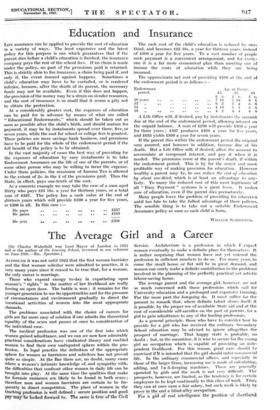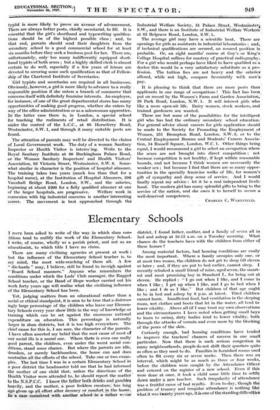The Average Girl and a Career
[Sir Charles Wakefield was Lord Mayor of London in 1915 and is the author of On Leaving School, reviewed in our columns on June 25th.—En. Spectator.]
ALTHOUGH it was not until 1922 that the first woman barrister and the first woman solicitor were admitted to practice, it is very many years since it ceased to be true that, for a woman, the only career is marriage.
Those who expend energy to-day in expatiating upon woman's " rights " in the matter of her livelihood are really forcing an open door. The battle is won ; it remains for the younger generation to use its opportunities and for the pressure of circumstances and environment gradually to direct the vocational activities of women into the most appropriate channels.
The problems associated with the choice of careers for girls are far more easy of solution if one admits the theoretical equality of the sexes and passes at once to consideration of the individual case.
The medical profession was one of the first into which women gained admittance, and we can see now how admirably practical considerations have vindicated theory and enabled women to find their own undisputed sphere within the pro- fession. In legal practice the definition of the appropriate sphere for women as barristers and solicitors has not proved quite so simple. At the Bar there are, no doubt, many cases where a woman's intimate knowledge of, and sympathy with, the difficulties that confront other women in daily life can be brought into play. At the same time the qualities that make for forensic eminence are likely to be found in both sexes ; therefore men and women barristers are certain to be fre- quently in direct competition. The place of women in the teaching profession is well defined ; secure position and good INtritray"be looked forward to. The same is trim otthe'Civfl Service. Architecture is a profession in which I expect women eventually to make a definite place for themselves. It is rather surprising that women have not yet entered the profession in sufficient numbers to do so. For many years to come the small house or flat will be in great demand, and women can surely make a definite contribution to the problems involved in the planning of the perfectly practical yet artistic labour-saving house.
The average parent and the average girl, however. are not so much concerned with those professions which call for University education and a prolonged and expensive training. For the more part the foregoing do. It must suffice for the present to remark that, where definite talent shows itself, it is possible, by the proper use of available State aid and at the cost of considerable self-sacrifice on the part of parents, for a girl to gain admittance to any of the leading professions.
As a general principle, those who have to consider how to provide for a girl who has received the ordinary Secondary School education may be advised to ignore altogether the prospect of marriage. That happy state is probable, no doubt ; but, in the meantime, it is wise to secure for the young girl an occupation which is capable of providing an inde- pendent livelihood. For this reason, great care should 1:e exercised if It is intended that the girl should enter commercial life. In the ordinary commercial offices, and especially in those of the larger firms, increasing use is made of calculating, adding, and took-keeping machines. These are generally operated by girls and the work is not very difficult. The prospects, however, are limited, as the tendency is for certain employees to be kept continually to this class of work. Titre; they can at once earn a fair salary, but such work is likely to prove in the ends blind-alley occupation. Fora girl Of real intelligence the position of shorthand typist is--more likely to prove an avenue of advancement. There are always better posts, chiefly secretarial, to fill. It is essential that the girl's shorthand and typewriting qualifica- tions should be of the highest possible class ; and, to that end, parents should send their daughters from the secondary school to a good commercial school for at least six months before they seek a business.post for her. There are, unfortunately, only too many indifferently equipped short- hand typists of both sexes ; but a highly skilled'clerk is almost certain to do well, especially if a few years of leisure are devoted to securing some such qualification as that of Felloar- ship of the Chartered Institute of Secretaries. • -Girl typists and secretaries are required in all businesses.
Obviously, however, a girl is more likely to advance to a really . ,
responsible position if she enters a branch of commerce that concerns itself with definitely feminine interests. An employee, for instance, of one of the great departmental stores has many opportunities of making good progress, whether she enters by way of the office administration or as a saleswoman apprentice. Id the latter case there is, in London, a special school for teaching the rudiments of retail distribution. It is under the control of the L.C.C., at 66 Horseferry Road, Westminster, S.W. 1, and through it many suitable posts are found.
The attention of parents may well be directed to the claims of Local Government . work. The duty of a woman Sanitary Inspector or Health Visitor is interesting. Write to the Royal Sanitary Institute at 90 Buckingham Palace Road, of the Woman Sanitaiy Inspectors' and Health Visitors'
Association, 92 Victoria Street, Westminster, S.W.• 8. Some- what similar in character is the position of hospital almoner. The training takes two years (much less than that for a hospital nurse), at the Institution of Hospital Almoners, 296 Vauxhall Bridge Road, London, S.W., and the salaries, begirming at about £200 for a filly qualified almoner at one
of the larger hospitals, are progressive. Welfare work in connexion with big industrial concerns is another interesting career. The movement is best approached through the Industrial Welfare Society, 51 Pala;ce_ Street, Westminster; S.W., and there is an Institute of Industrial Welfare Workers' at 65 Belgrave Road, London, S.W. I.
The average girl may have a scientific bent. There are openings for girls as assistants in industrial laboratories ; and;. if technical qualifications are secured, an assured position is, probable. Or, an eight months' course at Guy's or King's College Hospital. suffices for 'mastery of practical radiography. For a girl who would perhaps have liked to have qualified as a doctor this would be a very satisfactory substitute as a pro- fession. The tuition fees are not heavy and the salaries' offered, while not • high, compare favourably with men's, pay.
It is pleasing to think that there are more posts than applicants in one range of occupations ! This fact has been put on record by the Women's Farm and Garden Association,, 29 Park Road, London, N.W. 1. It will interest girls who like, a more open-aii. life. Dairy women, stock workers, and trained gardeners are wanted.
These are but some of the possibilities for the intelligent girl who has had the ordinary secondary school education.- For general advice about careets for girls application should be made to the Society for Promoting the Employment of Women, 251 Brompton Road, London, S.W. 3, or to the, Central Employment Bureau and Students' Careers Associa- tion, 54 Russell Square, London, W.C. I. Other things being equal, I would recommend a girl to select an occupation where the sexes are not brought into direct competition ; not because competition is not healthy, if kept within reasonable bounds, and not because I think women, are necessarily the weaker sex ; but because I find that there are so many oppor- tunities in the specially feminine walks of life, for women's gift of sympathy and deep sense of service., And I would, finally repeat my advice : let it be a real independent liveli- hood. - The modern girl has many splendid gifts to bring to the service of the nation, and she owes it to herself to secure a well-deserved competence.
CHARLES C. WAKEFIELD.























































 Previous page
Previous page